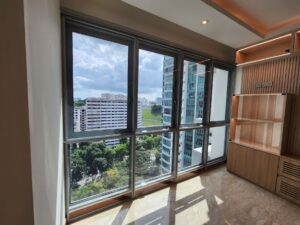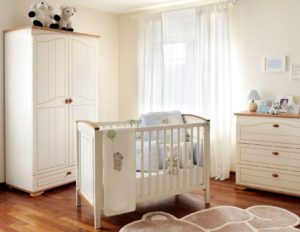As this is a question often asked by clients when looking for soundproofing solutions for their windows, we’ll be looking at the various factors to help you make an informed decision.

Is changing permitted?
The first point to consider is if you are allowed to change your windows. Many newer HDB apartments and most private condominiums do not approve windows to be replaced according to their building management rules. As changing the window potentially alters the look of the façade, a lot of developments won’t let you replace them. This is a fact many clients were not aware of; we would advise you as a first step to speak to your MCST to see what the rules regarding window changes are in your building.
Windows in heritage buildings are also usually not permitted to be replaced, unless there is a structural issue, in which case they are often restored rather than replaced altogether.
If the answer to the question above is NO, then your best option is to add Noise Shields to your existing windows to adequately soundproof them. Our Noise Shields are installed on the interior side of the windows and they are virtually invisible from the outside, thus not changing the exterior façade of the building. We also fix our framing to the wall around your window, therefore not mounting anything to the window itself and can be removed without permanent damage to the window and condo managements are happy with that.
What type of window can you install?
If you are able to replace your window then the next point to consider is what type of window you have:
- Hinged/Push-out window
- Sliding window
- Sliding glass door
Hinged or push-out windows generally provide better sealing than sliding windows do and can be build soundproof. If you currently have a push-out window and you are permitted to change it, then doing that is a very good option for you. Choose a high quality, hinged, soundproof window that has at least 3 locking points, with all-round seals and a suitable airgap. Make sure that the entire window system (and not only the glass) comes with an acoustic test certificate from the supplier, so you know what you are buying. Push-out windows come in a huge variety of quality levels and you want to make sure you buy one that is suitable for your noise situation.
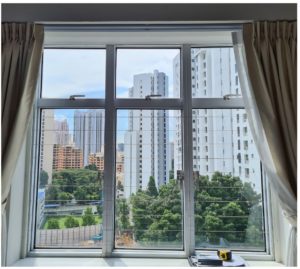
Sliding windows are very difficult to build soundproof as they have gaps for the tracks on which the windows slide and achieving proper compression and an air seal is near impossible. If you can replace your window, you will need to change from sliding to push-out to be able to get a notable sound reduction. Putting better glass into a sliding window will not make a difference. Push-out windows will look different from your original sliding windows and this often means that building management in condominiums will not permit you to change the window type. If you have to stay with sliding, no point in changing. In HDB corridor units restrictions to the window types used also apply.
The good news is that an add-on Noise Shield can work great for sliding windows as it retains the external look and provides a total air seal. Therefore, for sliding windows adding a noise shield is the best option.
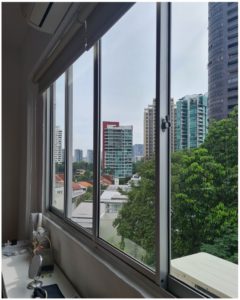

Sliding glass doors have the same issues as sliding windows – gaps, lack of compression and they are equally poor in their noise blocking ability. While there are commercial grade soundproof sliding doors available, these are often not suitable for the residential retrofit market due to size restrictions and differences in external look. The airtight seal necessary for successful soundproofing can be achieved with the magnetic seal of the Magnetite Noise Shields which work great in reducing noise coming through sliding doors.

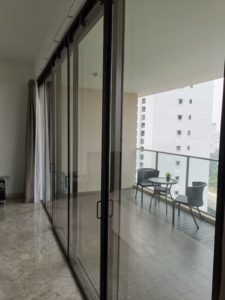
Do you want to change your window?
Lastly, you need to decide if changing your window is something you currently want to go through. Replacing a window system can be a challenging exercise. After navigating the mine field of identifying and choosing the right window for your needs, you need to apply for permits and deal with the dust, hacking noise and plaster and paint touch-ups afterwards. If that does not sound appealing and your window is still in decent condition, you can consider adding a Noise Shield instead. This requires no HDB permit or hacking and the general interruption to your home life is limited.
Not all windows labeled “soundproof” are alike
As not all soundproof windows are made alike, it is important to thoroughly research the window system and manufacturer when replacing your window. The blog post in this link, and the three following, give you some pointers of what to look out for: https://magnetite.com.sg/3-ways-to-reduce-noise-transmission-through-your-window/
We have often been called in to install our Noise Shields for soundproofing after the client had already changed their windows, as the newly replaced windows were of inferior quality and did not provide adequate soundproofing.
In summary, if changing your window is permitted in your development and you can install a soundproof push-out system then this might be the right option for you. If you can’t or don’t want to change your window or have to stay with a sliding window or door, installing a Magnetite Noise Shield will work best.
Our article next month will talk about in more detail why sliding windows and doors are so challenging to soundproof.
Meanwhile, find more information about our Magnetite Window Noise Shields here.

